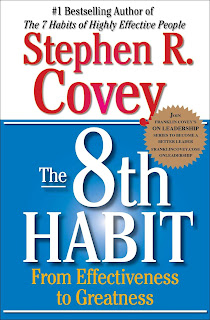In a previous article, Dr. JJ's 13 Rules for Living were shared.
 |
| Have you found your TRUE VOICE in life? If so, are you singing out with all your heart and then helping others to do the same? |
Find my true voice (discover who I really am) as soon as I can, develop that voice with all my heart, and then sing out shamelessly to the best of my ability and opportunities in a way that inspires and empowers others to do the same.
Our world—Planet Earth—is filled with wondrous diversity.
And when I say "Diversity," I'm not talking so much about race, ethnicity, religion, or any of the more common demographic categories that come to mind when the "D" word is employed, although that is certainly also true.
 |
| We too often think of diversity solely in terms of physical traits and other readily visible variables. But it is so much more than that! |
To illustrate, consider my own family (my own and my wife's), which consists of a group of individuals who, with very few exceptions, are all the same race, religion, background, gene pool, and general socioeconomic status. Yet what a diverse group we still manage to make! We don't all think alike, we don't all vote alike, and we have vastly different aptitudes, interests, hobbies, personalities, dispositions, and opinions. Sometimes we even disagree with each other vehemently.
This phenomenon of core-deep diversity among human beings is one of the single-most magnificent and magical elements of the human race.
 |
| Diversity properly harnessed leads to endless SYNERGY and productivity in an organization. |
Because core-deep diversity properly channeled is what has fueled the SYNERGY that has created the remarkable modern world we live in today with all of its wonders, creations, developments, advancements, and veritable miracles of science, medicine, and technology.
In a sea of such extraordinary diversity, it is important that YOU do the work required to discover your own TRUE VOICE as a self-action leader in your life and career. Doing so is the only way to maximize your own, unique contributions to our planet and its inhabitants.
It took me a LONG time to find my TRUE VOICE in life as a husband, father, writer, speaker, leader, teacher, historian, philosopher, and poet.
 |
| My first career ambition in life was to become a trash collector. |
I'm not kidding... I was so fascinated by garbage trucks and how they worked that I would literally sit and wait for the truck to arrive each week. This fascination spawned my life's first avocational ambition.
There is, of course, nothing wrong with being a trash collector if that is what you really want to do; nor is there anything wrong with using such a job as a bridge to other opportunities along your career path.
After all, I spent most of my growing up years (and even some of my adult years) employed in an array of obscure, low-paying, and physically demanding manual labor-oriented jobs. From mowing lawns and laying pipe to digging post holes and building fence; and from hauling wheat and plowing fields to painting, shoveling, sawing, pounding, and a hundred other related tasks, I have spent a great deal of time in my life toiling away sweat-drenched "in the trenches" of life—sometimes literally (as in the case of laying 12-inch pipe out in the deserts of the Southwest).
 |
| Having lived in Utah, Washington, Alberta, and Newfoundland, I've also shoveled my share of snow in life! Is it any wonder that I now live in South Florida? |
As much as these jobs did for my health, welfare, and character, they were nonetheless far removed from the kind of career I wanted to pursue.
I wanted to be a white collar professional, not a blue collar professional; not because there is anything wrong with blue collar professions; indeed, our society runs on—nay, that is too weak; our society DEPENDS UPON—the work that blue collar professionals complete day-in-and-day-out. Take away truckers, plumbers, mechanics, farmers, builders, and other service workers and it only takes about three days for our entire way of life to shut down—a phenomenon we have all experienced vestiges of during the COVID-19 pandemic and accompanying supply chain crisis.
 |
| You don't have to enroll in a college class to get a good education. |
For example, while I personally have an accredited doctoral degree, I can say with confidence that I have gained even greater knowledge and wisdom from my personal, proactive studies outside of formal classrooms as I have inside their sometimes restrictive walls.
"I have never let schooling get in the way of my education."
— Mark Twain
Moreover, there are soooooo many different ways to be SMART. To define IQ within the narrow parameters of academe is to truly miss the forest for the trees. The reality is that some of the smartest and most skilled and talented people on the planet do not have college degrees. To think that academic grades, test scores, and certifications are the only way to measure intelligence is woefully nearsighted and arrogantly naïve, as Harvard's Howard Gardner's work on the theory of multiple intelligences so lucidly illustrates.As a doctoral-level, white-collar professional, I am continually amazed at the knowledge, aptitudes, and skill-sets of a whole host of people who work in blue collar careers. While they may never be able to compete with my academic resume, I likewise could never compete with their technical acumen and niche skill-sets.
Such differences too often create unfair and unnecessary comparisons in our ego-driven world. But when viewed holistically, a variety of different careers from both the white and blue collar world serves as a reflection of the remarkable intellectual diversity that so richly imbues our planet.
 |
| I discovered at age seven (7) that I liked to read & study. |
As a junior in high school, I took a computerized "career assessment" to better gauge where my future career pathway might lie. It was only marginally helpful, and quite honestly, did not provide much clarity about my future. As it happened, I would find myself well into my undergraduate college education before I would begin discovering my TRUE VOICE and future career path.
But varied life experiences provided me with many clues along the way.
My first two years of college were focused more on theatre and drama. I took four different courses for actors, played a minor role in a collegiate production of Shakespeare's The Taming of the Shrew, and even considered declaring a major in theatre and drama.
 |
| It took many years, but eventually I discovered my TRUE VOICE as a writer and speaker. |
In the end, it became clear to me that English would be a better fit for me than theatre and drama, and certainly more practical as well. Not that I have ever been afraid to take risks—that's always been one of my greatest strengths—but I ultimately came to the conclusion that I would be more happy and successful as a writer than I would as an actor; and I have never second-guessed that decision, even though my aptitude and training in theatre and drama has undoubtedly helped me as a speaker, teacher, and leader.
By the time I was 24 years old, I was pretty clear on what my TRUE VOICE was. But that did not mean I had found my perfect job position yet. In fact,18 years later—and a variety of jobs and entrepreneurial ventures later—I am still struggling to get off the ground as a successful business builder, writer, and speaker. Nevertheless, it has been my experience that as long as I do my very best to move in the direction of my TRUE VOICE, life has a way of taking care of the rest.
Thus, the journey continues...
Once you have discovered your own TRUE VOICE, it is natural to desire to help others to find their voices as well. One of the COOL things about my job as an entrepreneur, writer, and teacher is that just about everything I do involves helping others to find their TRUE VOICE. I accomplish this by sharing my own personal journey and experiences in conjunction with teaching certain general (and true) principles I have learned along the way that I know will help others—just as they have benefitted me.
Fortunately, you do not have to have a job like mine in order to help others to find their TRUE VOICE. You can accomplish that by simply doing your best to sing our shamelessly with your own TRUE VOICE in your life and career and then seek out ways you can lift, help, encourage, and be an advocate for others who are in the process of finding their own way in life.
 |
| We can all benefit from having mentors. I certainly have! |
1. Observe yourself and others in action and then be a cheerleader for yourself and others by providing compliments and encouragement to pursue activities in which you/they excel.
2. Try lots of different activities to better gauge where your greatest interests lie—and encourage others to do the same.
3. Don't be afraid of failure. It is part of the process! Always remember that the only real failure is to give up on yourself or unnecessarily, lazily, or prematurely quit a worthy pursuit.
4. Once you have found something you are good at and enjoy, then observe, study, and practice—and encourage others to do the same.
5. Seek out teachers, coaches, and mentors to help guide you along the way—and encourage others to do the same.
6. Never give up trying—and encourage others to do the same!
By applying the right doses of vision, focus, hard work, determination, persistence, and patience, I promise YOU can eventually discover your own TRUE VOICE in your life and career. You will then be empowered to help others do the same.
For more information on finding your own voice and helping others to do the same, Freedom Focused encourages the reading of Dr. Stephen R. Covey's book, The 8th Habit: From Effectiveness to Greatness.Click HERE to buy a copy of The 8th Habit: From Effectiveness to Greatness by Stephen R. Covey.
NOTE: This article is the 8th in a series of 22 articles on the subject of LIFE RULES.
Click HERE to access quick links to the other 21 articles.
-Dr. JJ
Author's Note: This is the 237th Blog Post Published by Freedom Focused LLC since November 2013.
Click HERE for a compete listing of the other 236 FF Blog Articles.
.........................
Tune in NEXT Wednesday for another article on a Self-Action Leadership related topic.




No comments:
Post a Comment